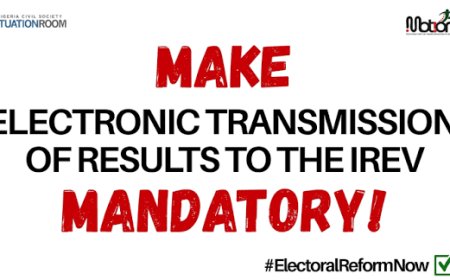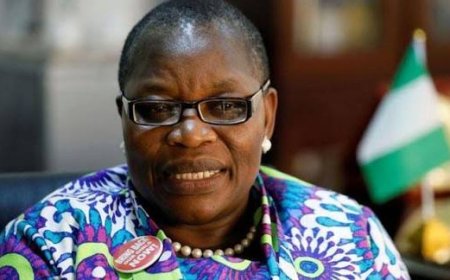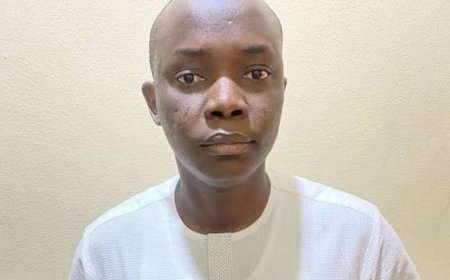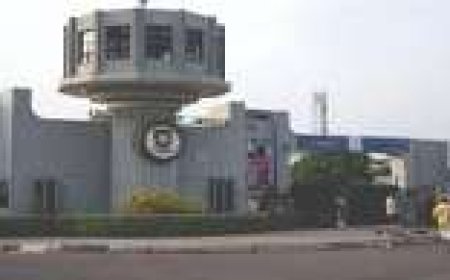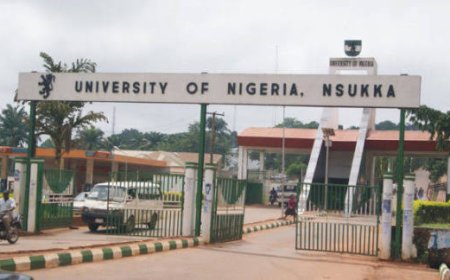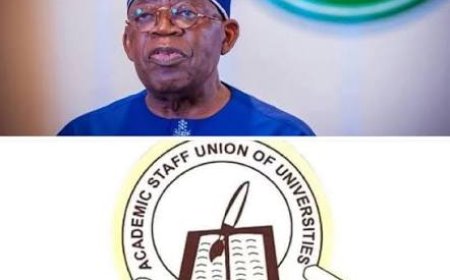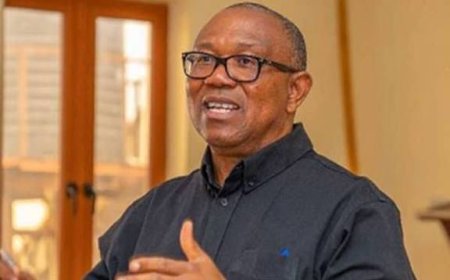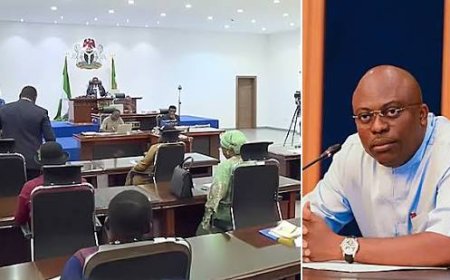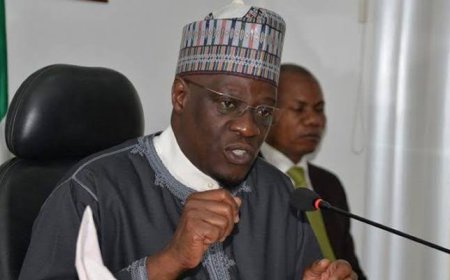Easter 2025: Rolling Away the Stone
As the Christian faithful in Nigeria and across the globe mark Easter 2025, a celebration of the resurrection of Jesus Christ, this sacred season comes with renewed calls for reflection
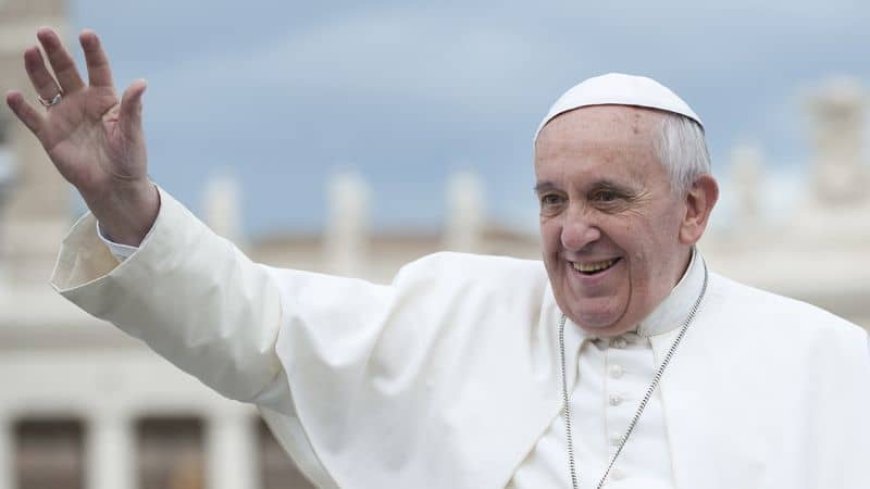
By Chris Agbedo, PhD
As the Christian faithful in Nigeria and across the globe mark Easter 2025, a celebration of the resurrection of Jesus Christ, this sacred season comes with renewed calls for reflection, repentance, and resurrection, not only in spiritual terms but also in moral, national, and socio-political dimensions. In Nigeria, a country grappling with insecurity, deepening poverty, hunger, and spiritual exhaustion, the Easter message of hope, sacrifice, and redemption, which speaks to the imperative of rolling away the stone and empting the tomb, becomes all the more urgent and necessary.
At the heart of Easter is the celebration of Christ’s triumph over death, offering salvation to humanity through love, sacrifice, and divine grace. To Christians of Nigerian extraction, Easter is not just a symbolic event but an enduring experience. It represents the ultimate expression of love that transforms human suffering into salvation, despair into hope, and death into life eternal. But the Easter message does not belong exclusively to Christians. Its principles of selflessness, justice, forgiveness, and rebirth transcend religious affiliations. For non-Christians, Easter offers a metaphorical compass; i.e., a call to communal responsibility, ethical leadership, and a reawakening of moral conscience. In a country fractured by ethno-religious fault lines and socio-political crises, this inclusive message can serve as the much-needed spiritual antidote to its chronic challenges.
As Nigeria marks Easter 2025, the country finds itself at a precarious crossroads. The dream of Nigerian statehood, once brimming with hope and possibilities, is fast petering off under the weight of structural dysfunctions and existential challenges. Of all these, insecurity remains the most potent threat to Nigerians. When criminals have unfettered liberty to mow down communities with impunity, razing homes, killing men, women, children, and the aged, it becomes difficult to sustain confidence in the ability of government to rise up to its primary responsibility of welfare and protection of life and property of citizens. The Benue-Plateau axis, once known as the food basket and cultural heart of the Middle Belt, has now become axis of human carnage. The fertile plains that once yielded yam, maize, cassava, rice, and fruits now soak in blood and echo with gunfire. What was meant to feed the nation has become the terrain of terror. It’s a cruel twist of fate that farmers – those who once toiled from dawn till dusk to sustain the nation’s food supply – are now either butchered in their own farms or displaced into IDP camps. The same soil that should nurture crops has become a mass grave as the once-thriving agricultural belt has now become a slaughterhouse.
Layered upon this is the choking burden of economic hardship. As the prices of essential commodities soar, millions of Nigerians are slipping below the poverty line. Hunger is no longer episodic; it is becoming systemic. Unemployment among youths, food scarcity, and currency devaluation have turned daily survival into a miracle. Politically, the fabric of trust between the governed and their leaders has almost completely eroded. The outcome of 2023 general elections, has struggled to reset the moral compass of leadership in the light of its controversial nature. Electoral promises remain substantially unfulfilled, while conduct of public officials tends to introduce a new dimension to prebendal politics. In the realm of religion, the country faces a spiritual crisis. Churches and mosques are increasingly commercialized. Some religious leaders now seem to function more as lobbyists than moral compasses. The line between the sacred and the profane is thinning out. Prosperity preaching has displaced prophetic truth-telling. In this context, Easter is a divine interruption, a reminder that suffering must yield to redemption, but only through sacrifice, humility, and moral courage.
In the light of the foregoing, it becomes even more apparent that Nigeria is in the throes of what can be described as a national crucifixion. While Easter calls for hope and resurrection, these multiple national challenges especially the ceaseless bloodbaths are symbols of a nation still nailed to the cross, pierced by injustice and indifference. Against this backdrop, the message of Easter becomes more urgent. Nigeria desperately needs a resurrection, not only of hope, but of justice, protection, and moral governance. As Christ bore the cross and was crucified in the name of salvation, Nigeria is being crucified by inertia and elite indifference. But unlike the Resurrection story, there appears to be no stone being rolled away in Nigeria’s national tomb of governance.
How then can the message of Easter be harnessed to address Nigeria’s multifaceted crisis? The answer lies in understanding and applying the symbolic elements of Easter, which entails sacrifice, hope, resurrection, and love within the socio-political realities of the Nigerian state. At the heart of Easter is the concept of sacrificial love, Christ laying down his life for the redemption of mankind. Nigeria’s leadership class must internalize this message. Leadership is not an entitlement but a sacrifice. Until our leaders embrace the ethic of servant leadership, putting the people first, rejecting ostentation, and confronting corruption, the dream of national transformation will remain a mirage. Public office must be redefined as a platform for national service, not personal aggrandizement. Imagine a Nigeria where elected officials live modestly, invest in public goods, and are held accountable. Such a vision aligns perfectly with the Easter spirit.
The resurrection is symbolic of new beginnings. Nigeria needs nothing short of a national resurrection, beginning with institutional reforms. The Easter season offers an opportunity to reflect on what must ‘die’ and what must ‘rise’ in Nigeria’s polity. Corrupt practices must die. Impunity must die. Ethnic bigotry must die. What must rise is a new Nigeria built on justice, inclusion, meritocracy, and accountability. We need reforms in the judiciary to restore public confidence in the rule of law. We need reforms in policing to prioritize community safety over state repression. We need electoral reforms to ensure that the people’s votes count. Easter reminds us that after every crucifixion, there is the possibility of resurrection, if the right choices are made.
Easter is also a season of hope, hope that even in the darkest of times, light will emerge. Nigeria’s youth, who make up over 60% of the population, represent this hope. Yet they remain marginalized, unemployed, and disillusioned. We must channel the Easter message into national youth empowerment strategies, through education reform, vocational training, start-up grants, and political inclusion. A nation that fails its youth crucifies its future. Easter calls us to stop the bleeding and roll away the stone of hopelessness suffocating Nigeria’s future.
Easter also exemplifies forgiveness. In a country where historical grievances run deep, from the wounds of the Civil War to religious crises, from herders-farmers conflicts to marginalization, there can be no peace without forgiveness and reconciliation. The federal government needs to embark on a Truth, Justice, and Reconciliation initiative, especially ahead of Nigeria’s 25 years of uninterrupted democracy. National healing cannot happen through amnesia; it must be deliberate. Easter shows us that even the worst betrayal can be redeemed through love and forgiveness. Also, Easter reminds us of the power of love. Not sentimental love, but radical love that compels us to care for the hungry, visit the imprisoned, shelter the homeless, and weep with those who mourn. In Nigeria today, where state institutions have faltered, the spirit of communal solidarity is our saving grace. Communities, churches, and civil society groups must become the hands and feet of hope. Nigerians must organize local feeding programmes, set up neighbourhood watch groups, support education funds, and pressure governments to act. Resurrection starts from the ground up.
This Easter, we must proclaim: there can be no resurrection without justice. There can be no peace without accountability. There can be no unity where blood flows like a river and the state appears indifferent. To the dead, we owe remembrance. To the living, we owe protection. To the future, we owe a reimagined Nigeria. Let Easter 2025 be a turning point; not in prayers alone, but in public action; not in hope alone, but in justice pursued relentlessly. Otherwise, the cross remains. And the stone stays unmoved. But Easter teaches that no grave is final and that the stone can still be rolled away.
Surely, the stone can be rolled away if Easter 2025 is not reduced to rituals, pageants, or religious festivities. It must provoke a moral awakening. Nigeria is in a Good Friday season, betrayed by its trustees, bleeding from its wounds, and hanging between despair and death. Let Nigerians of all faiths and ethnicities embrace this season with renewed conviction that our story is not over. Let leaders at all levels have a change of heart and lead with justice, truth, fairness, and compassion. Let the Church regain its prophetic voice. Let the people refuse to be complicit in their own oppression. The tomb is not the end. A resurrection is possible. But only if we, like Christ, are willing to sacrifice, forgive, and rise.
Finally, in spite of these national challenges, crowned by needless and avoidable bloodbaths, let the stone be rolled away and the tomb emptied in the spirit of Easter. Let it be rolled away from the tomb of our national paralysis, so that we might walk into the light of truth, justice, and renewal. Let it be rolled away from the grave of the conspiracy of silence, so that the voices of victims and survivors may echo through the chambers of power. Let it be rolled away from the casket of religious apathy, so that the message of the Cross may once again be about defending the oppressed, and not only about tithes and titles.
Let the stone be rolled away so that Nigeria may yet rise, not as ‘a mere geographical expression,’ but as a community of shared destiny, where no one is too poor to be heard, and no one too powerful to be held accountable. This is the call of Easter in 2025; a call not just to commemorate Christ’s resurrection, but to incarnate it in our politics, in our policies, in our prayers, and in our whole human essence. For if Christ could rise after Calvary, so too can Nigeria, but only if we choose to roll away the stone of our own complicity, complacency, and group inertia.
Happy Easter, Nigeria. May resurrection begin with you and I.
AGBEDO is a professor of Linguistics, University of Nigeria, Nsukka, UNN.
What's Your Reaction?















